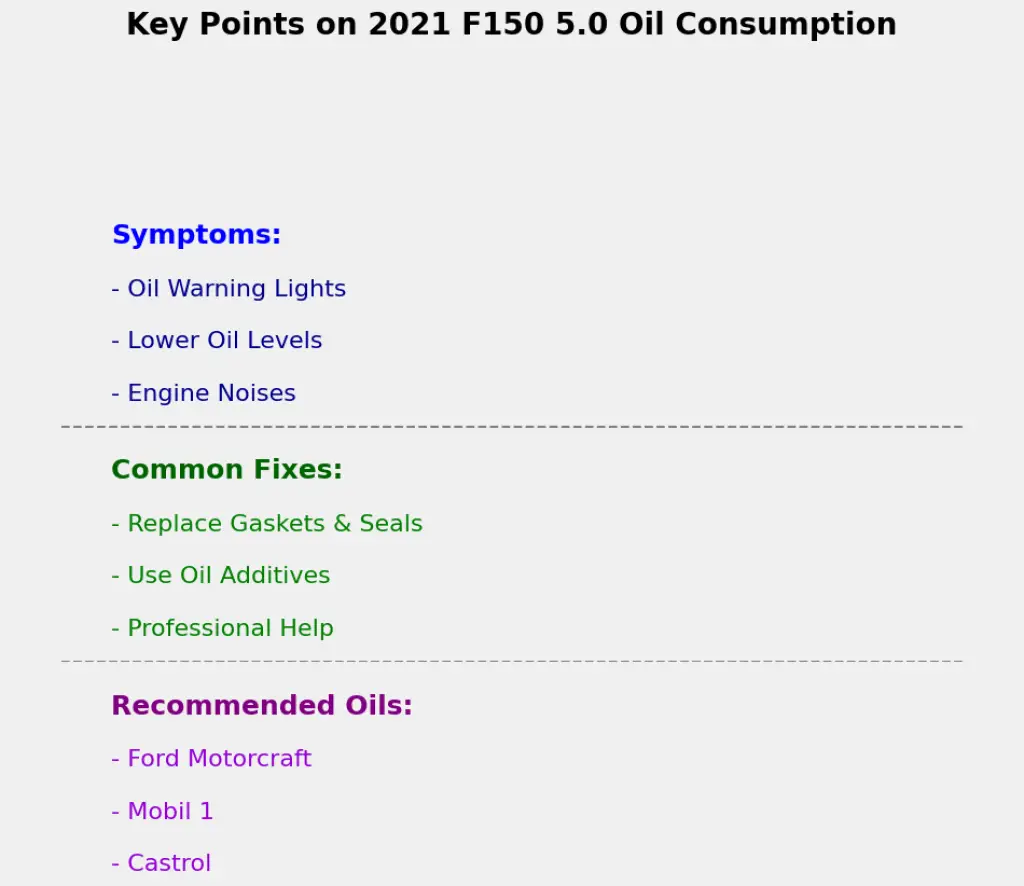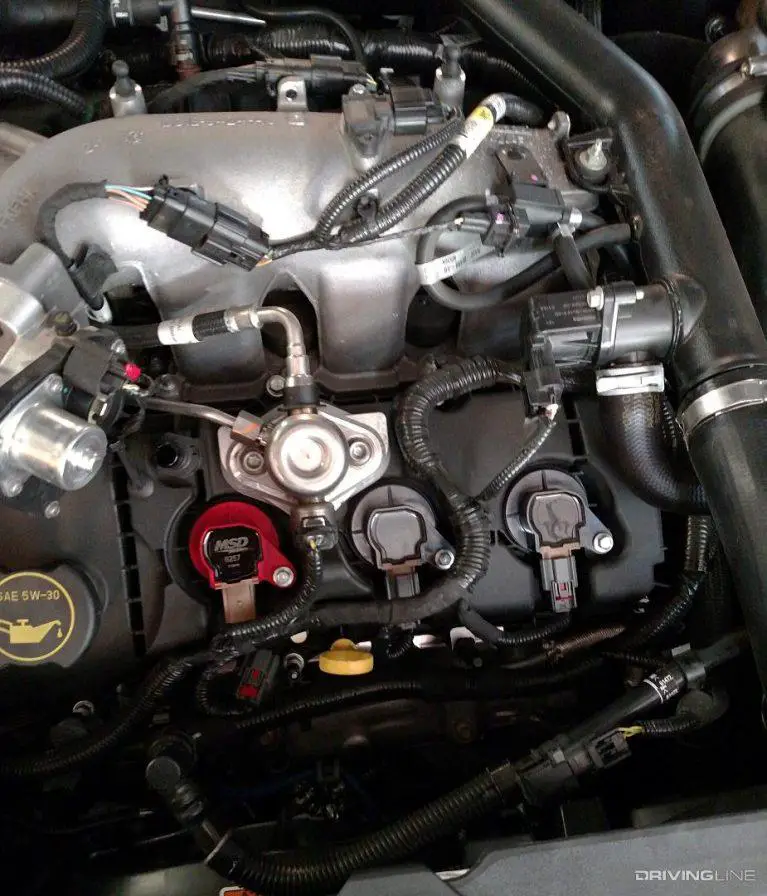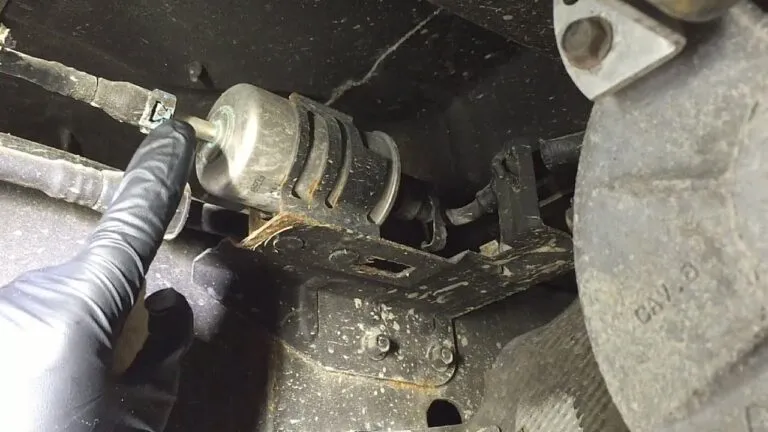2021 F150 5.0 Oil Consumption
Are you concerned about the oil consumption rates of your 2021 Ford F150 with a 5.0L engine? You’re not alone.
Understanding how your vehicle uses oil is crucial for its performance and longevity.
In this comprehensive guide, we’ll dive into everything you need to know about 2021 F150 5.0 oil consumption.
From common symptoms and troubleshooting tips to expert-recommended oils and fixes, we’ve got you covered.
Whether you’re a new F150 owner, an experienced mechanic, or considering buying this Ford model, this article offers valuable insights for everyone.
Stay tuned to keep your F150 running smoothly for years to come.

Understanding Oil Consumption in 2021 F150 5.0
Before diving into the specifics of oil consumption in your 2021 Ford F150 5.0, it’s essential to understand what oil consumption means and why it matters.
now, we’ll define oil consumption and explore the factors that influence it in your vehicle.
Definition of Oil Consumption
What Does Oil Consumption Mean?
Oil consumption is the rate at which your vehicle’s engine uses oil during operation. It’s measured in quarts per 1,000 miles.
Understanding this rate can help you maintain optimal engine performance.
Factors Influencing Oil Consumption
Why Does Oil Consumption Vary?
Oil consumption can be influenced by a variety of factors including driving habits, engine condition, and even the type of oil used. Here’s a closer look:
Driving Habits
Frequent short trips, aggressive driving, or towing can increase your vehicle’s oil consumption.
Engine Condition
An older engine or one that hasn’t been properly maintained can consume more oil.
Type of Oil
Synthetic oils tend to reduce oil consumption when compared to conventional oils.
Common Symptoms of Excessive Oil Consumption
If you own a 2021 F150 5.0, it’s crucial to recognize the signs of excessive oil consumption. Being aware of these symptoms can prevent long-term engine damage.
Now, we explore the key indicators you should look out for.
Oil Warning Lights
Don’t Ignore the Dashboard
If the oil warning light on your dashboard illuminates, it’s a clear sign that you should check your oil level. Ignoring this can lead to severe engine damage.
Lower Oil Levels Between Changes
Check, Don’t Guess
If you find that the oil level decreases significantly between regular oil changes, it’s a sign of high oil consumption.
Unusual Engine Noises
Listen to Your Engine
Knocking or ticking sounds from the engine often indicate low oil levels, which may mean your vehicle is consuming too much oil.
Troubleshooting Oil Consumption Issues
Noticing signs of excessive oil consumption in your 2021 F150 5.0? Don’t panic. The next step is to accurately diagnose the issue.
Now we will provide a guide for troubleshooting oil consumption problems, from simple inspections to advanced diagnostic methods.
Visual Inspection: Leaks and Seals
Start with the Basics
Before diving into complicated diagnostics, start with a visual inspection for any oil leaks. Check the seals, gaskets, and oil pan.
Gaskets and Seals
Look for any visible damage to the gaskets and seals around the engine.
Oil Pan
Ensure that the oil pan is intact and not damaged, as it can be a common source of leaks.
Advanced Diagnostic Methods: Compression Tests and Oil Monitoring Systems
Go Beyond the Surface
For a more detailed analysis, consider conducting a compression test or using an oil monitoring system.
Compression Tests
A compression test can help identify issues within the engine cylinders, which may contribute to oil consumption.
Oil Monitoring Systems
Advanced oil monitoring systems can provide real-time data on your oil levels, offering more insights into consumption rates.
When to Seek Professional Help
Expert Advice Can Save You Money
If you’re unable to diagnose the issue or if the problem persists, it’s time to consult a professional mechanic specialized in Ford vehicles.
How to Fix 2021 F150 5.0 Oil Consumption
Facing oil consumption issues with your 2021 F150 5.0? Rest easy. There are several fixes to get your truck back on track, ranging from simple component replacements to professional solutions.
Replacing Faulty Components: Gaskets, Seals, and Rings
Give Your Truck a New Lease on Life
Changing faulty engine components can drastically cut down on excessive oil consumption. Here’s what to focus on:
Gaskets and Seals
Leaking gaskets or seals can be the hidden culprits behind high oil consumption. A timely replacement can resolve the issue and prevent future problems.
Common Gasket and Seal Replacement Costs
| Component | Average Cost | Replacement Time |
|---|---|---|
| Valve Cover Gasket | $80 – $120 | 1-2 hours |
| Oil Pan Gasket | $100 – $150 | 2-3 hours |
| Rear Main Seal | $200 – $300 | 4-5 hours |
Piston Rings
Worn-out piston rings can allow oil to seep into the combustion chamber, contributing to excessive consumption. Replacing these can be labor-intensive but often resolves the issue.
Engine Treatments: Oil Additives and High-Mileage Oils
Boost Engine Efficiency
Sometimes, a simple additive or high-mileage oil can do wonders to reduce oil consumption. Let’s see how:
Oil Additives
Engine oil additives like seal conditioners can rejuvenate old seals, reducing leaks and consumption.
| Additive Type | Expected Reduction in Consumption |
|---|---|
| Seal Conditioners | 10-20% |
| Viscosity Modifiers | 5-10% |
High-Mileage Oils
If your truck has seen more road, high-mileage oils are formulated with additives to reduce consumption.
Professional Solutions: Engine Overhaul and Replacement
When All Else Fails, Go Pro
If you’ve tried DIY fixes and the problem persists, it might be time to consider more drastic measures.
Engine Overhaul
An engine overhaul involves replacing multiple components and is often a last resort to fix extreme oil consumption issues.
Engine Replacement
In some cases, an engine replacement may be more cost-effective in the long run than continuous repairs.
Cost Comparison
| Solution | Average Cost | Longevity Benefits |
|---|---|---|
| Engine Overhaul | $2,500 – $4,000 | 3-5 years |
| Engine Replacement | $4,000 – $6,000 | 5-10 years |
Recommended Oil for 2021 F150 5.0
Choosing the right oil is like picking the right fuel for a rocket—it can make all the difference in performance and longevity.
If you’re pondering over what oil best suits your 2021 F150 5.0, this section is your go-to guide.
Manufacturer’s Recommendations: Viscosity and Brands
Trust the Makers, They Know Best
Ford has specific recommendations for oil viscosity and brands that best complement your 2021 F150 5.0. Adhering to these can enhance engine efficiency.
| Viscosity | Recommended Brands |
|---|---|
| 5W-20 | Ford Motorcraft, Mobil 1 |
| 5W-30 | Castrol, Valvoline |
Viscosity Matters
The thickness of your oil, or its viscosity, plays a critical role in how your engine performs. For most climates, 5W-20 or 5W-30 is recommended.
Brand Choices
Ford Motorcraft is the go-to brand for many Ford owners, but other premium brands like Mobil 1, Castrol, and Valvoline also offer high-quality options.
Expert Picks: Synthetic vs. Conventional Oils
What the Pros Use
Synthetic oils are often favored by automotive experts for their better high-temperature stability and overall engine protection.
Synthetic Oils
Synthetic oils offer superior performance and are particularly useful in extreme temperatures. They can also help reduce oil consumption.b,./Conventional Oils
While less advanced than synthetics, conventional oils can be a cost-effective choice for well-maintained or low-mileage engines.
Seasonal Variations: Summer and Winter Oils
Weather Plays a Role, Too
Different seasons may call for different oil viscosities to optimize engine performance.
Summer Oils
In hotter months, a slightly thicker oil like 5W-30 can offer better engine protection.
Winter Oils
In colder temperatures, a thinner oil such as 5W-20 ensures that the oil flows more freely, providing better engine lubrication.
Knowing Your 2021 F150 5.0 Oil Capacity
Ever been puzzled about how much oil your 2021 F150 5.0 actually needs? Overfilling or underfilling can both cause issues.
This section demystifies your truck’s oil capacity, ensuring you get it just right during your next oil change.
Manufacturer Specifications
The Blueprint for Your Truck’s Health
Ford provides specific oil capacity specifications for the 2021 F150 5.0. Following these to the letter ensures your engine runs like a well-oiled machine—literally.
Table: Manufacturer Oil Capacity Specifications
| Engine Condition | Oil Capacity (Quarts) |
|---|---|
| With Filter | 7.7 |
| Without Filter | 7.0 |
Measuring Oil Levels: Dipstick and Sensors
Your Truck’s Vital Signs
Knowing how to accurately measure your oil levels can save you from future headaches. Whether you’re a fan of the good old dipstick or prefer modern sensors, here’s how to get an accurate read.
Dipstick Method
A tried-and-true method, the dipstick can be a reliable way to check oil levels. Just make sure the engine is cool and the truck is on a level surface.
Electronic Sensors
Many 2021 F150 5.0 models come equipped with electronic oil-level sensors that provide real-time data. These are handy but should be cross-referenced occasionally with a dipstick for accuracy.
Implications for DIY Oil Changes
Be Your Own Mechanic
Thinking about changing the oil yourself? Knowing your truck’s exact oil capacity is crucial for a successful DIY oil change.
Tools You’ll Need
A basic oil change kit, an oil filter wrench, and a drain pan are among the essential tools for a DIY oil change.
Steps to Follow
- Drain Old Oil
- Remove and Replace the Oil Filter
- Add New Oil
DIY Oil Change Costs vs. Professional Service
| Item | DIY Cost | Professional Service Cost |
|---|---|---|
| Oil (7.7 Quarts) | $25-$50 | Included |
| Oil Filter | $10-$20 | Included |
| Labor | $0 | $50-$100 |
Is it Safe to Use E85 in My F150 Ecoboost Engine?
When considering putting e85 in f150 ecoboost engines, it’s crucial to evaluate the potential risks and benefits. E85 is a blend of ethanol and unleaded gasoline, offering increased octane rating but decreased fuel efficiency. While some Ecoboost engines can handle it, it’s advisable to consult your vehicle’s manufacturer for compatibility and warranty concerns.
Maintenance Tips for Better Oil Management
Wondering how to prolong the life of your 2021 F150 5.0’s engine while keeping oil consumption in check? Timely maintenance is your best friend.
Let’s delve into some key tips that can make a difference.
Regular Oil Changes: Timing and Mileage
The Cornerstone of Engine Health
Consistent oil changes are the most straightforward way to ensure your engine stays in top shape.
Recommended Oil Change Intervals
| Mileage | Time Frame | Oil Type |
|---|---|---|
| 5,000 miles | 6 months | Conventional |
| 7,500 miles | 9 months | Synthetic |
Timing is Everything
Don’t just rely on mileage; time is also a factor. Even if you haven’t hit the mileage mark, changing the oil at least twice a year is advisable.
Mileage Markers
Keeping an eye on your odometer can help you time your oil changes perfectly. When you approach the recommended mileage, it’s time to schedule a change.
Quality of Oil Filters
The Unsung Hero of Engine Maintenance
The type and quality of your oil filter can significantly impact oil consumption and overall engine health.
Material Matters
Quality filters use synthetic materials that last longer and filter out smaller particles, contributing to reduced oil consumption.
Compatibility
Always check that the filter is compatible with your 2021 F150 5.0 to avoid any issues.
Engine Health Checks: Signs to Look Out For
Your Truck Talks, Learn to Listen
Your truck will often show signs when something’s off. Regular checks can help you spot issues before they escalate.
Smoke from Exhaust
Blue smoke is a telltale sign of oil burning and warrants immediate attention.
Oil Spots Under Vehicle
If you notice oil spots in your parking area, it’s likely you have a leak that needs fixing.
Sudden Mileage Drop
A sudden decrease in fuel efficiency can sometimes be linked to increased oil consumption and should be investigated.
Does the 5.0 F150 Engine’s Oil Consumption Affect its 1/4 Mile Time?
The f150 1/4 mile performance statistics may not be directly influenced by the 5.0 F150 engine’s oil consumption. While oil consumption can affect overall engine performance, its impact on the 1/4 mile time may be negligible. Factors like horsepower, torque, gearing, and vehicle weight play a more significant role in determining acceleration and top speed.
Summary and Key Takeaways
Navigating oil consumption issues in your 2021 F150 5.0 doesn’t have to be a maze. Keep these key points in mind:
- Follow Manufacturer Guidelines: Stick to Ford’s recommended oil types and capacities.
- Spot the Signs: Watch for warning lights and unusual engine sounds. Early detection can save you from costly repairs.
- DIY vs. Professional Help: Know when you can handle issues yourself and when it’s time to consult an expert.
- Regular Maintenance: Consistent oil changes and quality filters are your best bets for a well-performing engine.
In a nutshell, proper oil management is your ticket to a smooth-running and long-lasting 2021 F150 5.0. Whether you’re a DIY enthusiast or rely on professional services, this guide aims to equip you with the know-how you need.






